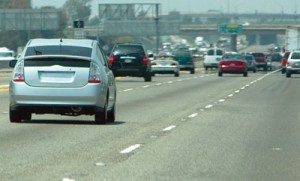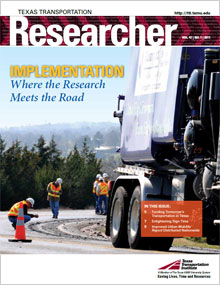
We often take our transportation system for granted. Then something happens — an ice storm, for example — to remind us just how much we depend on that system. Without it, our mobility, our economy, our very lives can become paralyzed.
Keeping existing system infrastructure operational and effectively planning future roadways are vital to meeting our transportation needs. And someone has to pay for it.
Therein lies the problem. Rising fuel prices and increasingly fuel-efficient and alternative-fuel vehicles will likely decrease revenues generated by federal and state fuel taxes. (These taxes are the primary funding mechanism for the maintenance and expansion of Texas’ roadways.)
“The fuel tax is a kind of ‘user fee’ levied on how much fuel you purchase at the pump,” explains Texas Transportation Institute (TTI) Senior Research Engineer Ginger Goodin. “As people buy less gas, less revenue is generated. Meanwhile, the demands on our transportation system are only growing.”
Goodin and her research team recently explored one funding alternative to the fuel tax, the mileage fee. In this system, a fee is assessed on every mile driven by a vehicle, rather than on every gallon of fuel purchased. In addition to studying existing mileage-fee implementation projects around the nation, researchers solicited input from 13 transportation stakeholder groups, a nationwide panel of technical experts, and five focus groups conducted in Texas communities of varying size and geography.
“Essentially we were evaluating whether or not Texas — as a state and as a community of people — is ready for mileage fees,” says TTI Associate Transportation Researcher Trey Baker, a principal member of the research team. “And the answer from the study is — not right now.”
Characteristically, Texans are pragmatic about mileage fees. While the opinions obtained in the study indicate people think mileage fees are a good idea in principle, they were more interested in fixing the current fuel-tax-based system before implementing another funding mechanism. Other concerns voiced by participants include the need to better understand the impact of electric vehicles on fuel-tax revenues and potentially revising how fuel taxes are currently apportioned (e.g., some fuel-tax revenues go toward education rather than highway maintenance).
One option for collecting information used in assessing a mileage fee would involve gathering detailed time and travel location data to ensure that only miles traveled in Texas would be assessed. While more accurate than an odometer-based alternative, this option piqued participant concerns about privacy. While the units wouldn’t actually “track movements,” they would collect data used to quantify travel.
“Right now there are numerous public acceptance barriers that make mileage fees non-viable for Texas,” says Goodin. “But we’re doing more research in the state and around the country to better understand these issues and how to implement this system if and when Texas is ready.”
Mary Meyland, director of strategic policy and performance management at the Texas Department of Transportation, acknowledges that the issue is complex. “TTI‘s expertise has been vital in helping us identify the issues surrounding implementing mileage fees in Texas. Having Ginger and her team help us further evaluate this idea bodes well for our making the best decisions for Texans.”
